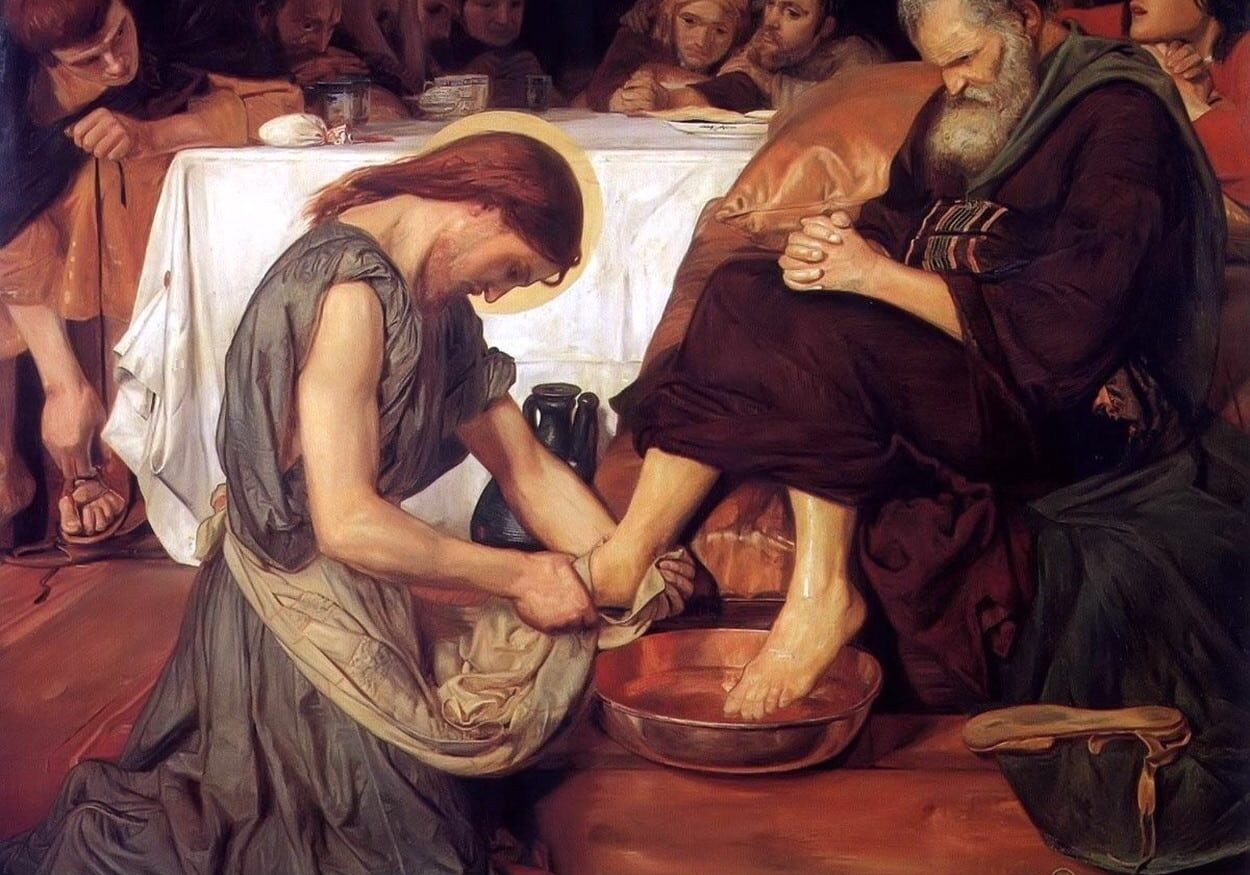†
Let us begin by clarifying a theological truth, understood throughout the Pauline Epistles, as it relates to who are ‘of Abraham’ and who are not. Paul says in Galatians 3.16, “Now to Abraham and his Seed were the promises made. He does not say, ‘And to seeds,’ as of many, but as of one, ‘And to your Seed,’ who is Christ…” Note St. Paul’s emphasis on Seed vs. Seeds in this statement, implying GOD’s promise was to an Heir of a particular sort, and not simply a people related to him by blood or genealogy. In fact, Paul tells us exactly who this Seed is, which he identifies as the true Heir of Abraham: ‘It is Christ,’ and Christ is the Anointed One, the Messiah, JESUS, born of the Virgin Mary, begotten of the Father in Heaven.
And as for the promises of GOD to Abraham that would come through his Seed, the Christ, what were they? We can read about them in several places in Holy Scripture, but summarily, GOD says in Genesis 17.7: “And I will establish My covenant between Me and you and your descendants after you in their generations, for an everlasting covenant, to be GOD to you and your descendants after you.” — If you are not a student of the Bible, then you should know that it was some seven hundred years after GOD made His covenantal promise to Abraham that He led the children of Israel (that is Jacob) out of Egypt. making a covenant with them through Moses, in their generations, to be their GOD and, they His people in the promised land, if they would keep His Law.
We oft forget that the promise GOD made to Abraham in covenant was different from the one He made with Jacob’s people, through Moses on Mt. Sinai. The one was of faith, and the other was of law. The genealogical seeds of Abraham were called Jacob or Israel, and the heirs of Abraham’s faith are called Christians, after that Seed. Jacob went on to inherit a geography and a holy city, with a temple, that expanded and shrank, until it was finally taken away and destroyed in A.D. 70. Christians have inherited the everlasting Kingdom of the Seed, who is Christ, which is ever expanding in this world in the hearts of men, from generation to generation, until the Day of Redemption, and it is the Everlasting Kingdom of the everlasting promise made to Abraham.
The Gospel Lesson for this Trinity Thirteen helps us to understand an age-old question: ‘Does GOD define Abraham’s Seed by sovereign, geographical land markers and ethnic heirs, or is there something more there? Something of faith and obedience that surpasses the limits of a particular ethnic, human family, practicing the dictates of a very ancient oracle, given from atop a holy mountain?
Some might like to challenge the premise of this argument by saying, ‘Wait, JESUS was Judean, that is, a genetic descendant of Abraham, and thus the promises are fulfilled and sustained in JESUS to Abraham’s genetic offspring. JESUS fulfills both the promise to Abraham by faith, and to Jacob by law, such that ethnicity and geography do matter. Right?’ — To this, St. Paul counters in Romans 9.6: “They are not all Israel who are ‘of Israel’ (of Jacob), nor are they all (GOD’s) children because they are the seed of Abraham.” — In other words, just because someone is a descendant of the Abrahamic line, does not mean that they are ‘of’ true and faithful Israel.’ Rather, those who are descendants ‘of the faith’ of Abraham are true Israel. — JESUS made this point as well when speaking to the Pharisees in the Treasury of the Temple in John’s Gospel. There, JESUS said, “‘I know that you are Abraham’s descendants, but you seek to kill Me, because My word has no place in you … you are of your father, [the devil].’ They answered and said to Him, ‘Abraham is our father.’ Jesus said to them, ‘If you were Abraham’s children, you would do the works of Abraham. But now you seek to kill Me … You do the deeds of your father’” (St. John 8.37 & 39-41).
In biblical, covenantal thought and vernacular, it matters who you ‘are in’, which perhaps is better translated in our modern vernacular as who you ‘are of.’ — In teaching the Corinthians that Kingdom membership as Christians is not about who your Christian leader is – the person who brought you into the Kingdom of GOD in Christ – but who you are ‘of’. Paul writes: “Now I say this, that each of you says, ‘I am of Paul,’ or ‘I am of Apollos,’ or ‘I am of Cephas,’ or ‘I am of Christ.’ Is Christ divided? Was Paul crucified for you? Or were you baptized in the name of Paul?” (1 Corinthians 1.12). — In other words, Paul is saying, “Were you devoted to my service, or engaged to be my disciples, [to be ‘of me’ by that sacred rite (of Holy Baptism)? Did I challenge that right in you, or dependence from you, which is the proper claim of your GOD and Redeemer, JESUS Christ?’ No one is to … usurp Christ’s authority, nor encourage anything in the people that looks like transferring His authority to them. He is our Saviour and sacrifice – he is our LORD and guide.”2 We are ‘in Him’ and ‘of Him’, and we live and move and have our being ‘because of Him.’
When we are ‘of someone’ or ‘in someone’, from the Bible’s perspective, then we have given our fidelity to the authority of that person in trust and faith. We then, pledge to follow them – to walk in their ways in obedience. — For those who are ‘of Moses,’ follow Moses and fall under the weight of the law. — Those who are ‘of Christ’, follow Christ and are resurrected by the power GOD by grace through faith. Thus, Paul says: “For you are all sons of GOD through faith in Christ Jesus. For as many of you as were baptized ‘into’ (or ‘of’) Christ, have put on Christ. There is neither Jew nor Greek, there is neither slave nor free, there is neither male nor female; for you are all one, [when you are ‘of’, or] ‘in’ Christ Jesus. And if you are Christ’s, then you are Abraham’s seed, and heirs [of the Everlasting Kingdom], according to the promise” (vv. 26-29).
This is some rich theology for a Sunday morning homily, I know, but I hope this now helps us make sense of statements like what St. Paul has written — ‘For they are not all Israel who are ‘of Israel’ (of Jacob), nor are they all (GOD’s) children because they are the seed and genetic heirs of Abraham; for GOD does not define Abraham’s offspring by their sovereign land markers and genetic heritage, but by the faith of Abraham, who believed GOD that his eternal salvation would be in his Seed, even Christ.
This should then cause us to reflect upon those things that reveal or define those who are ‘of Christ’ -who are baptized ‘into Him’ and born of His seed, having the righteous faith of Abraham? — What human behavior can be seen in Christians that truly reveals that they are Christians, and not solely members of a temporal religious sect? — Well, let me tell you: “A certain man went down from Jerusalem to Jericho, and fell among thieves, who stripped him of his clothing, wounded him, and departed, leaving him half dead… But a certain Samaritan, as he journeyed, came where he was. And when he saw him, he had compassion.” (St. Luke 10.30 & 34).
The nineteenth-century Bishop of Durham, Dr. J.B. Lightfoot, said, “Where JESUS saith, ‘Thou shalt love thy neighbor’, he means to accept all Gentiles, but for the extremely religious Judeans, Gentiles are not ‘our neighbors’, but those only that are of our own nation and religion.’ The hyper-religious would not put an Israelite to death for killing a Gentile, for he was not his neighbor: Yet, admirably, they did indeed say that Judeans ought not to kill a Gentile whom they were not at war with. But, if they saw a Gentile in danger of death, these legalistic men thought themselves under no obligation to help save his life. Such wicked inferences and notions did they draw from that holy covenant, (influenced over time by men), which GOD had distributed to them.”1
Understanding that JESUS was pressing the Judean people to love GOD and their neighbors in ways that were contrary to their reading of the Law of Moses, the Sadducees, Pharisees, Scribes, and experts in the Law challenged JESUS on His understanding of what it was, truly, to be a Judean – a son and seed of Abraham. — To test JESUS’ concept of neighbor, a certain expert in the Law of Moses invoked a conversation with the LORD. This expert gave his opinion first, and it was, well, elitist as Bishop Lightfoot has described. The idea that the promises and blessings of GOD should be extended in any way to wayward Judeans, and (Heaven forbid), Gentiles, was anathema to the hyper-religious and law-abiding in Israel. — Thus, the law expert, “wanting to justify himself, said to JESUS, ‘And who is my neighbor?’” (St. Luke 10.29).
As historian Tom Holland has recently said, JESUS was preaching and living “a kind of universal brotherhood and sisterhood that included all people with the faith of Abraham. However, famously, not all Judeans were keen on having their sense of distinctiveness dissolved into a kind of universal mush that included faithless Judeans as well as foreign Gentiles.”3 In other words, JESUS’ teaching demanded that differences between Judeans that made them distinctly Judean, ethnically, religiously, and socially, should be dissolved — dissolved in Christ – in those who are of Him – those who are of the faith of Abraham.
In an effort to persuade His adversaries that they too could become true sons of Abraham, truly, thereby becoming inheritors of eternal life, JESUS tells the parable of the Good Samaritan. — So, like the law expert and other elites in Israel, let us today listen again, and be persuaded to become true sons and daughters of Abraham. Let us note, mark, inwardly digest, and then apply the attitude and actions of the Samaritan to our lives, wherever we might be lacking.
First, the Samaritan, journeying, we know not where or on what time schedule, has compassion on the man that fell among thieves who was beaten, stripped, and left for dead. This, JESUS is strong to point out because the compassion that JESUS is expressing is distinct. In its Greek meaning “it becomes the hinge between human need and divine intervention.”4 The Samaritan’s initial instinct, (which so often escapes us in our Christian Walk), is that its source is the compassionate heart of GOD. The heart that does not consider it robbery to be equal to GOD, but rather making one of no reputation, even to the extent of becoming a bondservant to the needs of others. (cf. Phil. 2.5-6) — And having GOD’s heart, the one with compassion is driven to respond to the human condition empathetically – even mercifully – especially when sin lashes out, causing tragedy and suffering within human relationships.
The Samaritan’s instinct is drastically contradictory to the instinct seen in the attitudes and actions of the priest and the Levite. These two also came and saw the abused man, and instead of exhibiting the heart of GOD and having compassion on him in his abused condition, they passed by on the other side of the road from him, offering what can only be called ‘anti-compassion’, or ungodly coldness. — To know who our neighbor is, begins with seeing our fellow man with the compassionate heart of GOD. And if we do, then one’s personal station, agendas, and agency are gladly and willingly interrupted by compassion, becoming the hinge between human need and divine intervention. None of this was evident in the elite and self-righteous.
Secondly, the Samaritan does for the brutalized Judean what the hyper-religious and puritanically legal class would not even do for a Gentile – of course, this is the LORD’s point. Finding his source of compassion in the heart of GOD, the Samaritan ministers to the disabused man with his resources and time. — He goes to the man and “bandages his wounds, pouring on oil and wine; and he then sets him on his own animal, bringing him to an inn, to take care of him. And on the next day, when he departed, he took out two denarii (two days’ wages), gave them to the innkeeper, and said to him, ‘Take care of him; and whatever more you spend, when I come again, I will repay you’” (St. Luke 10. 34-35).
Where the self-righteous in Israel would not assist a Gentile in dire need, the Samaritan does for a Judean, willingly, against the traditions of men. Instead of feeling no compunction to assist the fallen man, JESUS’ good Samaritan saw a Judean in danger of death, and he believed himself under every obligation to help save his life. He thus laid down his own life, inconvenienced himself in his journey, and ministered to the man from his own resources, such that he saved and preserved the man’s life.
So, how does GOD define who Abraham’s true offspring are – ‘If you were Abraham’s children, you would do the works of Abraham. But now you seek to kill Me.’ — Being a Good Samaritan and doing such things as these are evidence of being an inheritor of eternal life.
In today’s Gospel Lesson, JESUS exposes how the self-righteous and legalistic of Israel thought themselves above reproach – nay, above their fellow man – Judean or Gentile. Thus, JESUS makes the foil of His parable, these types of people – anti-compassionate and godlessly cold toward their neighbors. St. Cyril, Bishop of Alexandria in the 4th century, observes that it was as if these elitists were saying: “Who is there for me to love as myself? I surpass all, I am a lawyer; I judge all, and am judged of none; I decide for all, and am liable to no man’s decision; I differ from all; I am better than all; all need me, but I need no one; who then is my neighbor, that I should love him as myself?”5
I pray today, as we should every Sunday, and every day of the week, ask of the LORD: ‘How shall I inherit eternal life today?’ For those who think this may be an impertinent question, St. Cyril says: “Thou has seen, O lawyer, and it has been proved by Christ’s parable, that it is of no avail whatsoever to any man, to be set up by empty names, and to pride himself upon unmeaning and ridiculous titles, so long as the excellence of compassionate deeds does not accompany those titles. For the dignity of the priesthood is unavailing to its owners, and equally so is being called learned in the law to those who are so reputed, unless they excel also in deeds of compassion. For lo! a crown of love is being twined for him who loveth his neighbor, just like the Samaritan – just like our LORD JESUS.”6
The Good Samaritan, and those like him, by faith, character, and deed, are sons and daughters of Abraham – they reveal that they are ‘in’ and ‘of’ Christ. — The message of the Gospel of JESUS Christ embraces, as neighbor, not only our countrymen, but all who share our nature; and these we are to love more than ourselves, following our LORD JESUS’ example, Who laid down His life for His friends, willingly, revealing the hinge between human need and divine intervention. — Let us then ask today, and every day, brothers and sisters of St. Mark’s: ‘If I desire to inherit eternal life, am I treating my neighbor, friend, and enemy, like the Good Samaritan; viz., like JESUS treats me?’ Amen.
1 Henry, Matthew. BlueLetterBible.org. “Commentary on St. Luke 10.” Accessed 10 September 2025. https://www.blueletterbible.org/Comm/mhc/Luk/Luk_010.cfm?a=983001
2 Henry, Matthew. BlueLetterBible.org. “Commentary on 1 Corinthians 1”. Accessed 10 September 2025. https://www.blueletterbible.org/Comm/mhc/1Cr/1Cr_001.cfm?a=1063012.
3 TRIGGERnometry.co.uk. “Historian Tom Holland: Islam, Christianity, & the West.” Accessed 11 September 2025. https://podcasts.apple.com/us/podcast/triggernometry/id1375568988?i=1000725400398&r=2169.
4 BibleHub.org. “Strong’s lexicon review of compassion (σπλαγχνίζομαι).” Accessed 12 September 2025. https://biblehub.com/greek/4697.htm.
5 St. Cyril of Alexandria, Commentary on the Gospel of St. Luke, “Footnote 2,” (Astoria: Studion Publishers Inc., 1983), 289.
6 Cyril, 290.
Join Us for Biblical Worship, Study, & Fellowship
Sundays:
Morning Prayer 9:45 am
Coffee & Catechesis 10:30 am
Holy Communion 12:00 pm
Thursdays:
Holy Communion 6:00 pm
Recent Sermons




